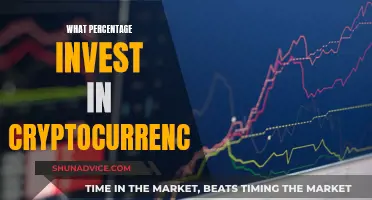
Bitcoin futures are a way to speculate on the future price of Bitcoin without actually owning the cryptocurrency. They are contracts between two investors who bet on the future price of Bitcoin, with the contract settled in cash. Bitcoin futures are available on some traditional trading platforms, such as CME and Cboe, as well as on dedicated cryptocurrency exchanges like Binance and Kraken.
To trade bitcoin futures, you need to deposit funds onto a trading platform that offers futures trading for BTC. You then purchase a futures contract, which is usually time-based and has an expiry date. The most common types are monthly, quarterly, and perpetual futures.
While trading bitcoin futures can offer the potential for profits, it is a very high-risk activity due to the volatile nature of the cryptocurrency market. It involves the use of leverage, which can amplify losses if the market moves against your position. It is, therefore, more suited for advanced traders.
What You'll Learn

Bitcoin futures trading platforms
There are several trading platforms that offer Bitcoin futures. Here is a list of some of the most popular ones:
- Binance Futures: Binance is the world's leading crypto exchange in terms of spot market activity. Its futures platform offers a diverse range of cryptocurrencies, with over 340 derivative trading pairs available. Binance also offers high-leverage options and a competitive fee structure.
- Bybit: Bybit is similar to Binance in terms of listed cryptocurrencies and trading products. It offers a wide range of futures contracts, including those settled in stablecoins or underlying cryptocurrencies. Bybit also boasts a high leverage limit of up to 100x on select contracts.
- Kraken Futures: Kraken is a well-established and trusted cryptocurrency exchange that offers a dedicated futures trading platform. It provides a multi-collateral wallet, allowing users to manage their positions with various collateral options. Kraken also offers leverage and flexible risk management tools.
- Bitfinex: Bitfinex has been in operation since 2012 and has introduced several innovative features over the years. It is particularly popular among advanced traders, offering customisation options and multiple limit orders. Bitfinex offers a range of Bitcoin and altcoin futures with competitive fees.
- OKX: OKX is a strong competitor in the crypto futures market, handling billions of dollars in daily trading volume. It offers a comprehensive range of crypto contracts, including perpetual swaps, futures, and options. OKX also has a competitive fee structure and a unique trading bot marketplace.
- Bitget: Bitget is a newer entrant to the crypto scene but has gained prominence through strategic decisions and growth. It offers a variety of futures contracts and advanced features like trading bots and copy trading.
- Coinbase Advanced: Coinbase Advanced (formerly Coinbase Pro) is aimed at experienced traders and offers a wider range of orders, tools, and derivatives instruments. It is one of the few platforms that cater to US customers, although the selection of contracts is limited.
- PrimeXBT: PrimeXBT is a versatile trading platform that lists various assets, including cryptocurrency futures. It provides high leverage (up to 200x) and competitive fees. PrimeXBT caters to both advanced and beginner traders with educational resources and walkthroughs.
- BitMEX: BitMEX is a pioneering platform in the crypto derivatives market, particularly known for its Bitcoin perpetual futures contracts. It offers spot trading and a range of crypto derivatives, including perpetual swaps and futures contracts. BitMEX has also introduced the BMEX token, similar to other exchange tokens.
- Deribit: Deribit is a reputable crypto derivatives platform, mainly known for its options products. However, it also offers cryptocurrency futures, including USDC-settled futures for various altcoins. Deribit supports high leverage (up to 100x) and provides a testnet version for traders to practice strategies without risk.
These platforms offer a range of features and cater to different needs, so it is essential to research and compare them before choosing one that aligns with your investment goals and risk tolerance.
How to Invest in Bitcoin Using E-Trade
You may want to see also

How to trade bitcoin futures
Trading in Bitcoin futures is a way to gain exposure to the cryptocurrency market without ever having to own any. It involves making an agreement with another party to buy and sell a specific amount of Bitcoin at a specific future price and time.
To trade Bitcoin futures, you must have an account with a registered futures commission merchant or introducing broker. You can choose from a variety of venues to trade monthly Bitcoin futures, some regulated and some unregulated. The Chicago Mercantile Exchange (CME) and the Chicago Board Options Exchange (CBOE) are two of the most well-known regulated trading venues.
- Do your research to understand how Bitcoin futures trading works.
- Create an account with the brokerage or exchange where you plan to trade.
- Get approval from the trading service provider to start futures trading. This approval will depend on funding requirements and your experience with derivatives trading.
- Choose your preferred Bitcoin futures product.
- Create a trading plan and manage your risk.
- Open your futures position and monitor it.
- Close your position before the contract expires if you wish to do so.
It's important to remember that trading in Bitcoin futures carries risks due to the volatile nature of the cryptocurrency market.
Dogecoin Investment: Safe or Risky Bet?
You may want to see also

Risks of trading bitcoin futures
Bitcoin is a highly volatile and speculative investment, and trading bitcoin futures contracts comes with significant risks that investors should carefully consider. Here are some of the key risks associated with trading bitcoin futures:
- Volatility and Price Fluctuations: Bitcoin is known for its volatile price swings, which makes investing in bitcoin futures risky. Small changes in the underlying asset's price can have a significant impact on the value of the futures contract.
- Leverage Risk: Bitcoin futures often involve leverage, which can amplify gains but also losses. This means you could lose more than your initial investment.
- Lack of Regulation: Most bitcoin futures trading occurs on unregulated exchanges, which may expose investors to fraud, security breaches, and excessive risk-taking.
- Potential for Fraud and Manipulation: The underlying cash or "spot" bitcoin market lacks regulation and has a higher potential for fraud and manipulation.
- Difference in Investment Outcome: A rise in Bitcoin prices may not always result in a similar increase in the value of a fund holding bitcoin futures contracts due to differences in delivery months and the underlying commodity's spot price.
- High Expenses: Trading bitcoin futures may involve higher expenses, such as fees and margin requirements, which can impact overall investment returns.
- Limited Investor Protections: While funds trading bitcoin futures must comply with certain legal requirements, investors should be aware that positions in bitcoin and bitcoin futures are highly speculative and may not provide the same level of protection as traditional investments.
- Risk of Loss: All investments carry the risk of financial loss, and this risk is heightened in bitcoin futures due to the high volatility and potential for fraud in the underlying bitcoin market.
- Rollover Risk: At the end of a futures contract, investors must decide to roll over their contracts to new ones or let them expire. This decision adds complexity and can impact the overall investment outcome.
Why Older Generations are Investing in Bitcoin
You may want to see also

Pros and cons of bitcoin futures trading
Bitcoin futures are a contract between two parties to buy or sell a set amount of Bitcoin at a predetermined price and future date. This derivative instrument allows investors to speculate on the future price of Bitcoin without owning the currency.
Pros
- Hedging against risk: Trading futures contracts can protect investors from potential price crashes. If the market price falls below the contract price, investors can sell their Bitcoins at the higher contract price and limit losses.
- Speculating without ownership: Bitcoin futures allow investors to speculate on the future price of Bitcoin without owning any of the currency. This can be done by taking a long or short position on the contract.
- Mitigating risk with stops and limits: Most exchanges allow traders to place stop and limit orders when trading futures contracts. These orders automatically buy or sell assets once they reach a specific price, helping to manage risk.
- Flexibility: Investors can use a variety of collateral types to manage their positions without moving funds around.
Cons
- Magnified risk: Leverage can magnify losses and gains, increasing the potential for higher profits or greater losses.
- Not suitable for everyone: Bitcoin futures contracts are complex instruments that may not be suitable for all investors.
- Trading fees: The costs of trading can eat into profits, affecting overall returns.
- Volatility: Bitcoin is known for its volatile price swings, which makes investing in Bitcoin futures risky.
- Unregulated exchanges: Most exchanges offering cryptocurrency futures trading are unregulated, exposing investors to potential fraud and security breaches.
Post-Pandemic: Bitcoin's Best Investment Opportunities
You may want to see also

Bitcoin futures liquidation and collateral
Bitcoin futures are a form of derivative trading where two investors enter a contract to bet on the future price of Bitcoin. These contracts are traded on exchanges such as the Chicago Mercantile Exchange (CME) and Chicago Board Options Exchange (CBOE). The contracts have specific requirements, including the number of units, pricing, and settlement methods, that must be met. For example, the CME offers Bitcoin futures contracts of 5 Bitcoin with a margin requirement of 50% of the contract amount.
When investing in Bitcoin futures, it is important to consider the risk of liquidation. Bitcoin derivatives positions are often maintained with a self-selected margin, which can be too low to avoid automatic liquidation by the exchange, especially during periods of high volatility. In 2021, nearly $80 billion of positions on centralised exchanges were liquidated, resulting in an average daily liquidation of over $200 million. Therefore, investors must account for the possibility of automatic liquidation when taking positions in Bitcoin futures.
To minimise the risk of liquidation, investors can employ hedging strategies. An optimal hedging strategy aims to minimise the variance of the hedged portfolio and the probability of liquidation due to insufficient collateral. The choice of hedging instruments depends on various factors, including the statistical characteristics of spot and futures extreme returns, leverage selection, loss aversion, and collateral management.
Collateral plays a crucial role in Bitcoin futures trading. Margin, also known as collateral, is the minimum amount of funds that must be deposited in an account to execute trades. The margin requirement for Bitcoin futures trading can vary depending on the exchange and the contract specifications. For instance, the CME requires a 50% margin for Bitcoin futures, while brokerages like TD Ameritrade may set their own margin rates on top of the exchange's base rate.
The amount of collateral required also depends on the leverage used in the trade. Leverage allows traders to amplify their buying or selling power by using borrowed funds from the exchange. However, higher leverage increases the volatility of the trade, leading to the potential for higher profits or more significant losses. The maximum leverage amount is regulated by government agencies for regulated exchanges, while unregulated exchanges may allow excessive risk-taking with higher leverage ratios.
Famous Faces: Who's Betting Big on Bitcoin?
You may want to see also
Frequently asked questions
Bitcoin futures are contracts between two investors who bet on a future price of Bitcoin, allowing them to gain exposure to Bitcoin without purchasing it.
You can buy and sell Bitcoin futures on cryptocurrency exchanges such as Gemini, Kraken, Coinbase, Crypto.com, CME, and Cboe.
Trading Bitcoin futures is considered very high-risk and is more suited for advanced traders as it often involves the use of leverage, which increases the chance of loss.







